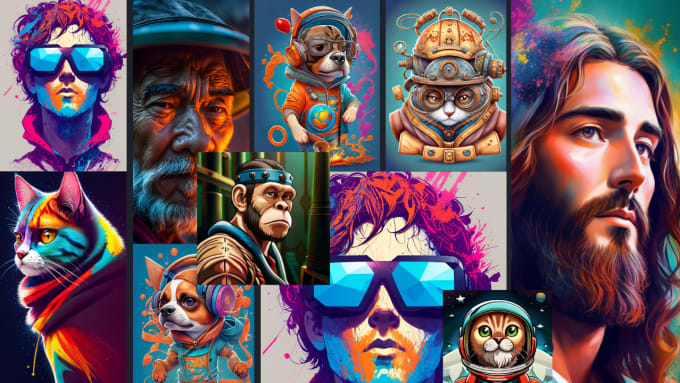Explore the intersection of AI art and human identity in this in-depth analysis. Discover how AI challenges traditional notions of creativity, influences personal and cultural identity, and raises philosophical questions about existence in a digital age.
The emergence of intelligence (AI) has brought about a change in industries notably in the world of art. The rise of AI generated artwork prompts discussions, on topics like creativity, originality and the core of what it means to be human. As machines demonstrate the ability to create art that can match human craftsmanship it challenges our definition of artistry and encourages an exploration, of identity and purpose. This in depth analysis explores the intersection of AI art and human identity examining how this trend influences our views on creativity, uniqueness and the essence of being.
The Evolution of AI in Art
The integration of AI, into processes has been on the rise leveraging algorithms and machine learning to produce art. Whether it's in music, literature or visual arts AI systems have the ability to analyze data learn patterns and create works. Examples like DeepArt and DALL E showcase the impressive potential of AI in generating images based on descriptions or existing styles highlighting its capacity to imitate human creativity.
The advancement of AI art has also given rise to collaborations between artists and AI technology. These partnerships offer artists an opportunity to push their boundaries and explore uncharted realms. In these collaborations AI serves as a tool that enhances creativity allowing artists to experiment with concepts and styles that may not have been feasible before.
The Challenge to Human Creativity
AI art's impact challenges our understanding of creativity. Traditionally seen as a quality tied to emotions and individuality the rise of AI generated art prompts us to reconsider what creativity means. Are machines truly creative or do they simply mimic patterns from data? This dilemma sparks a discussion about the nature of art creation. While some argue that AI can't match the emotional depth and intent of human artists others suggest that creativity isn't limited to humans. This debate raises questions, about the essence of expression and whether an artists identity or the artwork's impact defines the creation process.
Exploring Identity Through AI Art
The rise of AI in art sparks discussions, on personal and cultural identity. Artists integrating AI into their creative workflows face dilemmas regarding their identities and the identities conveyed through their creations. AI can serve as a mirror reflecting the artists values, heritage and experiences while also distancing from notions of authorship.
For example when an artist collaborates with an AI system the resulting artwork may blur the boundaries between machine contributions. This prompts inquiries about ownership and authenticity. If an AI produces art that resonates with an audience whose identity is represented in that piece? Is it the artists, the AI or a blend of both? This ambiguity challenges established concepts of authorship and encourages interpretations of identity within the realm of art.
AI Art as a Mirror of Society
AI-generated art can reflect our societies values, fears and dreams. By examining the motifs in AI created pieces we can understand pressing issues, like how technology impacts our lives what creativity means and the effects of machine learning. For instance AI art might delve into feelings of isolation, the human experience in a world and the intricate dynamics between people and technology.
Additionally as AI algorithms learn from existing art and cultural references they may unintentionally reinforce biases, present in society. This raises concerns about the possibility of AI art perpetuating stereotypes or sidelining marginalized voices. Collaboration between artists and technologists is essential to ensure that AI crafted art encompasses perspectives and experiences promoting inclusivity and empathy.
The Philosophical Implications of AI Art
The intersection of AI and art sparks inquiries into the essence of life and what it truly means to be human. With machines taking on roles once tied to creativity we find ourselves grappling with questions about our place in the world. If machines can produce art that stirs emotions and provokes thoughts what does that imply about the distinctiveness of the human experience?
Philosophers have long pondered the nature of consciousness and the attributes that define humanity. The emergence of AI challenges these discussions urging us to reevaluate the boundaries of consciousness and creativity. Are the emotions and intentions behind art truly irreplaceable or can machines replicate these qualities? This exploration prompts considerations about the essence of existence and the elements shaping our self perception.
The Future of AI Art and Human Identity
With the progress of technology its influence, on art and human identity is expected to expand. In the future we may witness collaborations between artists and AI that give rise to forms of creativity that reshape our perception of imagination. This evolving partnership could give birth to artistic movements combining intuition with machine learning offering insights, into identity and existence. Furthermore as society grapples with the implications of AI generated art discussions, on ethics, ownership and authenticity are set to gain importance. Artists, technologists and audiences need to engage in conversations about AI's role in art and its impact, on identity. By fostering a dialogue that addresses the challenges posed by AI art we can navigate the complexities, of this new era, in creativity.
In Conclusion
The rise of AI in art raises questions, about who we are as humans and what it means to exist. With machines now producing art that pushes the boundaries of creativity and ownership we find ourselves reconsidering the definition of an artist. The blending of identity through AI generated art prompts us to think deeply about the essence of creativity, awareness and the human journey. Looking ahead embracing the partnership between artists and AI will play a role in shaping the future of art and our self perception in a digital age.
